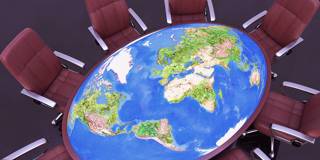Most policy mishaps in the world economy today – as in the case of US President Donald Trump’s tariffs – occur as a result of failures at the national level, not because of a lack of international cooperation. And, with the exception of two types of cases, countries should be allowed to make their own mistakes.
CAMBRIDGE – US President Donald Trump has used national security as a justification for his tariffs on steel imports, his threatened tariff hikes on autos, and the tariffs he recently vowed to impose on Mexican imports. “If you don’t have steel, you don’t have a country,” he declared (to cite just one example). While Trump’s national-security claim seems absurd on the face of it, it raises difficult questions for the word trade regime and global economic governance more broadly.
The critical challenge of global governance is determining the dividing line between policy domains in which nation-states are free to do as they please and those that are regulated by international agreement. In a world economy that has become increasingly interdependent, pretty much everything that one country does spills over to others.
But such spillovers are not by themselves a sufficient reason to constrain national autonomy. Consider public education, gasoline taxes, or highway speed limits. Each of these policies has consequences for trade partners. Improved skills alter a country’s comparative advantage and hence others’ trading opportunities. Gasoline taxes and speed limits affect demand for oil and hence prices on world markets. Such policies are not regulated internationally, and doing so would be widely – and rightly – considered absurd.

CAMBRIDGE – US President Donald Trump has used national security as a justification for his tariffs on steel imports, his threatened tariff hikes on autos, and the tariffs he recently vowed to impose on Mexican imports. “If you don’t have steel, you don’t have a country,” he declared (to cite just one example). While Trump’s national-security claim seems absurd on the face of it, it raises difficult questions for the word trade regime and global economic governance more broadly.
The critical challenge of global governance is determining the dividing line between policy domains in which nation-states are free to do as they please and those that are regulated by international agreement. In a world economy that has become increasingly interdependent, pretty much everything that one country does spills over to others.
But such spillovers are not by themselves a sufficient reason to constrain national autonomy. Consider public education, gasoline taxes, or highway speed limits. Each of these policies has consequences for trade partners. Improved skills alter a country’s comparative advantage and hence others’ trading opportunities. Gasoline taxes and speed limits affect demand for oil and hence prices on world markets. Such policies are not regulated internationally, and doing so would be widely – and rightly – considered absurd.